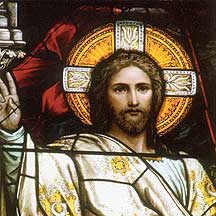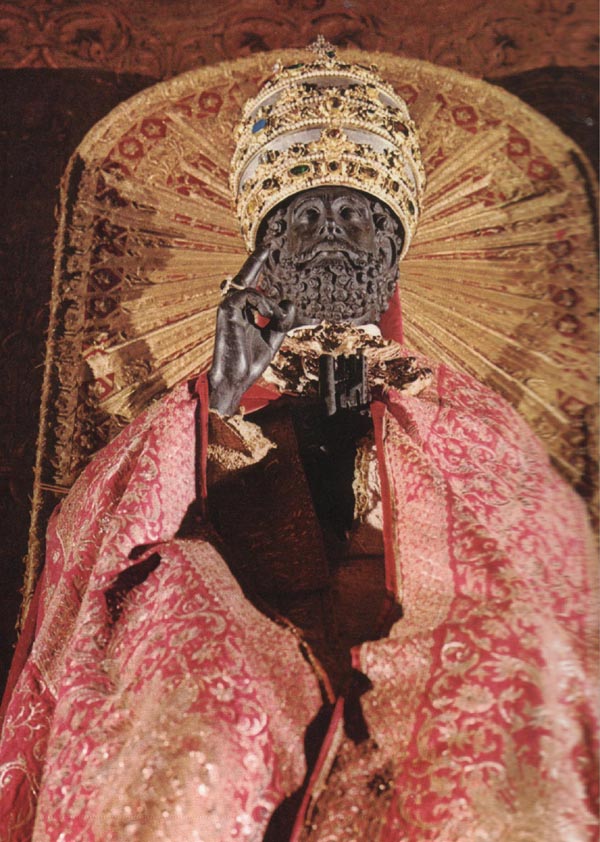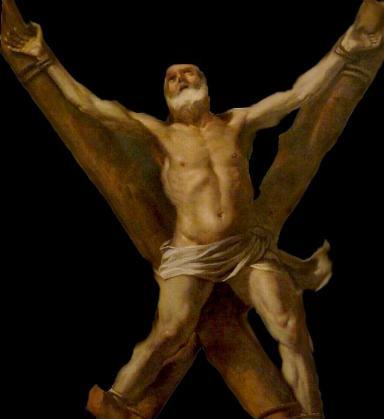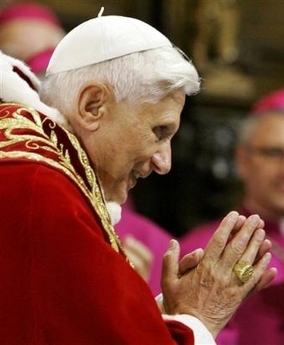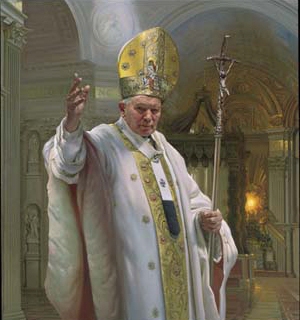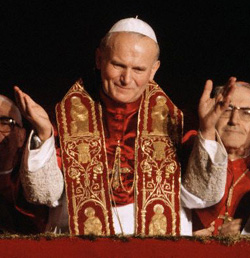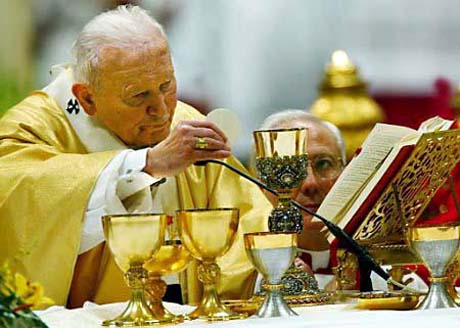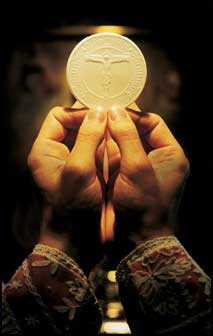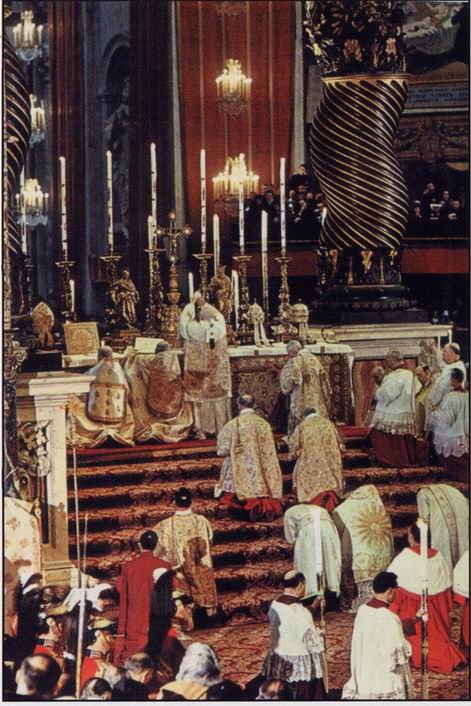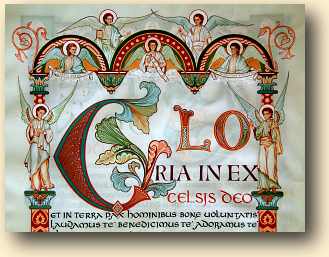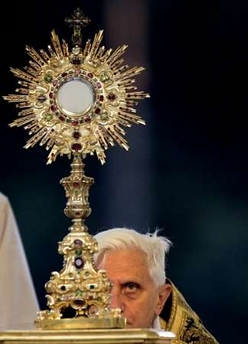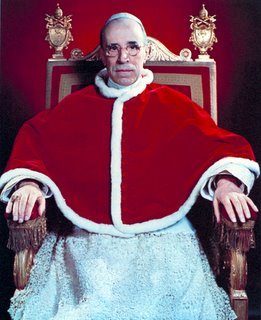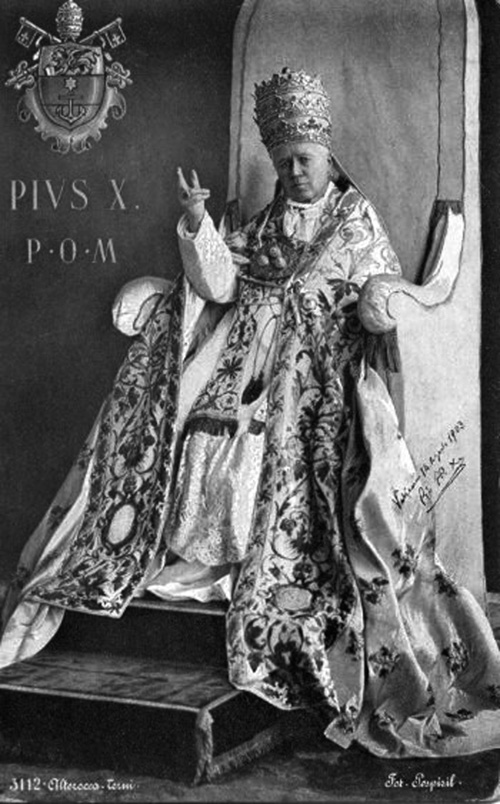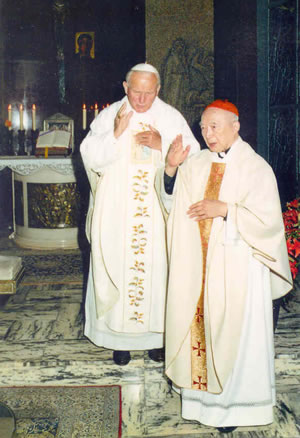15 hours ago
Tuesday, November 29, 2011
Be the kind of man
Be the kind of man that when your feet hit the floor each morning, the Devil says "Oh crap, he's up".
Thursday, November 03, 2011
Schola cantorum IC Penang's latest threads
Wednesday, November 02, 2011
Our newly renovated Church
General view of the Sanctuary. Big six candlesticks, stained glass windows of the Assumption in the center, and from the left, St. Peter, St. Francis Xavier, St. John the Baptist and St. Paul. In front of the main altar is the Lamb of God seated on a scroll with 7 seals.

Details from the Gothic arches above the doors and the statues of the Sacred Heart of Jesus and St. Joseph on the walls. The opposite walls have the statues of St. Therese and St. Anthony.

General view of the nave. The pews are really ugly, a remnant of the Spirit of Vatican II.

The statue of Mary inside the Church flanked by stained glass windows of the Annunciation and the Finding of the Child Jesus in the Temple.

The stained glass window of the Nativity. The memorial above commemorates the Catholic dead from World War II with an inscription that reads "Their tomorrow for our today"
For those of you who don't remember, here's what the Church used to look like. It was renovated in 1970's so it was chock full of the Spirit of Vatican II.

The High Altar was really really high, as if modelled upon the Confessio of St. Peter's only there's nothing below it, just the sacristy. Note the ugly holes in the walls which was pretty trendy in the 70s. Yucks.
Friday, October 14, 2011
A new star in the blogosky
Dear Takamasa Ishihara (no, not the famous Miyavi, he's more of a Myvi) recounts the first part of his conversion experience. Do go and say hi.

(NOT Miyavi)

Myvi
Thursday, October 13, 2011
Wednesday, October 12, 2011
Without and within

While He (Jesus) was speaking, a Pharisee asked Him to dine with Him; so He went in and sat at table. The Pharisee was astonished to see that He did not first wash before dinner. And the Lord said to him, "Now you Pharisees cleanse the outside of the cup and of the dish, but inside you are full of extortion and wickedness. You fools! Did not He who made the outside make the inside also? But give for alms those things which are within; and behold everything is clean for you." -Luke 11:37-41 I was serving Mass yesterday evening, and I was tired after a day at work and sleepy and it was very warm, especially under the layers of cassock, surplice and street clothes. When the Gospel reading began, I thought it was the familiar white-washed tombs reading. But a closer listen showed something different.

How much more ashamed would my Lord be if called upon to claim me as one of His own before His Father, me a sinner. And I was ashamed to claim to be a follower of My Lord and God? How stupid can I be? I now make the sign of the Cross, not to show off, but to own up to being a Christian, a follower of the Crucified one. It was not easy. It was a process that took time. I was still very reticent about drawing attention to myself and it took great effort of mind and will to do it, consistently. But in doing so, it forced be to guard by behaviour and my manners, to be worthy of that great sign of our salvation. It's the same reason I wear a crucifix. I kneel down to pray, not to show off, but that's the way I was taught to pray. We kneel when approaching our Maker and Creator. Despite what others might think or what others might be doing and even if no one does it. Not to feel superior, but because it's the way our conscience dictates that God should be approached and while our bodies can still do so, let us kneel!. If it becomes something that's too easy, something done without thought, then stop. If it's done to glorify yourself, then stop. But if it's difficult, if it's not something that you really want to do cos it draws attention, it makes you guard your tongue and your behaviour, then consider doing the externals.
The Pharisee invited Jesus to dinner and Jesus did not perform the ritual ablution but dived straight in. I guess the poor Pharisee let his astonishment show for he was in for a very stern rebuke. On the surface, the message, now familiar, should be pretty clear. It's a message that those who tend to neglect the outward elements of the faith, be it attending Mass, praying, fasting, wearing a crucifix or even dressing decently often fling in the face of those of us who either do those things or try to promote them. It's what's inside that's important, it's the heart (or thought) that counts. Cut all the externals and focus on the internals and stop being so legalistic and Pharisaical and all will be fine. A closer reading firstly reveals that the message cuts both ways! "You fools! Did not He who made the outside make the inside also?" So, the dish should be cleaned on the outside AND inside. For God not only made the heart, but the body as well and what is in our heart should be manifested outwardly, not in a showy, self-serving and self-promoting way like the Pharisee who prayed loudly on the steps of the Temple extolling his own righteousness in contrast to the tax-collector, but in al way that should come naturally.
What's inside will come through and will shine through. In a non-Christian country like Malaysia, wearing the external symbols of the faith, such as a crucifix brings no benefit to the wearer but instead serves as a proclamation and a visible sign of the Christian faith. When the authorities are so afraid of letting crosses be erected on the tops of Churches, this tangible presence of Christianity and Christ and the sacred in the public square is something that should be promoted. Similarly, making the sign of the Cross in public, especially when we pass by a Church. It reminds ourselves and others of the Presence that dwells within those walls. It's not an easy thing to do. It draws attention. And for many of us, the last thing we want to do is to draw attention to ourselves. Especially when you're an adolescent. I can relate to that. When I was a kid, I was taught to make the sign of the Cross when passing by a Church. When I grew older, the gestures became smaller and faster until it was no more than a small sign made by my fingers over my heart (when no one was looking). However, one day, when I was taking the bus, I noticed a lady making a prominent sign of the Cross as we passed a Church, and everyone was looking. I remembered feeling very very ashamed, for being ashamed. I was ashamed of the sign of the Cross, ashamed of what others might think and in so doing, forgot how my Lord must have felt to see me 'deny' Him in public.
Similarly, making the sign of the Cross in public, especially when we pass by a Church. It reminds ourselves and others of the Presence that dwells within those walls. It's not an easy thing to do. It draws attention. And for many of us, the last thing we want to do is to draw attention to ourselves. Especially when you're an adolescent. I can relate to that. When I was a kid, I was taught to make the sign of the Cross when passing by a Church. When I grew older, the gestures became smaller and faster until it was no more than a small sign made by my fingers over my heart (when no one was looking). However, one day, when I was taking the bus, I noticed a lady making a prominent sign of the Cross as we passed a Church, and everyone was looking. I remembered feeling very very ashamed, for being ashamed. I was ashamed of the sign of the Cross, ashamed of what others might think and in so doing, forgot how my Lord must have felt to see me 'deny' Him in public.
The Pharisee invited Jesus to dinner and Jesus did not perform the ritual ablution but dived straight in. I guess the poor Pharisee let his astonishment show for he was in for a very stern rebuke. On the surface, the message, now familiar, should be pretty clear. It's a message that those who tend to neglect the outward elements of the faith, be it attending Mass, praying, fasting, wearing a crucifix or even dressing decently often fling in the face of those of us who either do those things or try to promote them. It's what's inside that's important, it's the heart (or thought) that counts. Cut all the externals and focus on the internals and stop being so legalistic and Pharisaical and all will be fine. A closer reading firstly reveals that the message cuts both ways! "You fools! Did not He who made the outside make the inside also?" So, the dish should be cleaned on the outside AND inside. For God not only made the heart, but the body as well and what is in our heart should be manifested outwardly, not in a showy, self-serving and self-promoting way like the Pharisee who prayed loudly on the steps of the Temple extolling his own righteousness in contrast to the tax-collector, but in al way that should come naturally.
What's inside will come through and will shine through. In a non-Christian country like Malaysia, wearing the external symbols of the faith, such as a crucifix brings no benefit to the wearer but instead serves as a proclamation and a visible sign of the Christian faith. When the authorities are so afraid of letting crosses be erected on the tops of Churches, this tangible presence of Christianity and Christ and the sacred in the public square is something that should be promoted.
 Similarly, making the sign of the Cross in public, especially when we pass by a Church. It reminds ourselves and others of the Presence that dwells within those walls. It's not an easy thing to do. It draws attention. And for many of us, the last thing we want to do is to draw attention to ourselves. Especially when you're an adolescent. I can relate to that. When I was a kid, I was taught to make the sign of the Cross when passing by a Church. When I grew older, the gestures became smaller and faster until it was no more than a small sign made by my fingers over my heart (when no one was looking). However, one day, when I was taking the bus, I noticed a lady making a prominent sign of the Cross as we passed a Church, and everyone was looking. I remembered feeling very very ashamed, for being ashamed. I was ashamed of the sign of the Cross, ashamed of what others might think and in so doing, forgot how my Lord must have felt to see me 'deny' Him in public.
Similarly, making the sign of the Cross in public, especially when we pass by a Church. It reminds ourselves and others of the Presence that dwells within those walls. It's not an easy thing to do. It draws attention. And for many of us, the last thing we want to do is to draw attention to ourselves. Especially when you're an adolescent. I can relate to that. When I was a kid, I was taught to make the sign of the Cross when passing by a Church. When I grew older, the gestures became smaller and faster until it was no more than a small sign made by my fingers over my heart (when no one was looking). However, one day, when I was taking the bus, I noticed a lady making a prominent sign of the Cross as we passed a Church, and everyone was looking. I remembered feeling very very ashamed, for being ashamed. I was ashamed of the sign of the Cross, ashamed of what others might think and in so doing, forgot how my Lord must have felt to see me 'deny' Him in public. 
The Gospel reading reminded me that yes, although what's inside is important, what we do externally is important as well. It's doubly hard to be a Christian inside and out, to be clean inside and out. But we are psycho-somatic beings, we are not disembodied spirits, but beings of both body and soul. That unity should always be manifested in all we do, for the greater glory of God.
Monday, October 10, 2011
The original Egyptians
Saturday, October 08, 2011
The Hound of Heaven
Father John Powell, a professor at Loyola University in Chicago, writes about a student in his Theology of Faith class named Tommy:

Some twelve years ago, I stood watching my university students file into the classroom for our first session in the Theology of Faith. That was the day I first saw Tommy. He was combing his long flaxen hair, which hung six inches below his shoulders.
It was the first time I had ever seen a boy with hair that long.
I guess it was just coming into fashion then. I know in my mind that it isn't what's on your head but what's in it that counts; but on that day. I was unprepared and my emotions flipped.
I immediately filed Tommy under "S" for strange... Very strange.
Tommy turned out to be the "atheist in residence" in my Theology of Faith course.
He constantly objected to, smirked at, or whined about the possibility of an unconditionally loving Father/God. We lived with each other in relative peace for one semester, although I admit he was for me at times a serious pain in the back pew.
When he came up at the end of the course to turn in his final exam, he asked in a cynical tone, "Do you think I'll ever find God?"
I decided instantly on a little shock therapy. "No!" I said very emphatically.
"Why not," he responded, "I thought that was the product you were pushing."
I let him get five steps from the classroom door and then I called out, "Tommy! I don't think you'll ever find Him, but I am absolutely certain that He will find you!" He shrugged a little and left my class and my life.
I felt slightly disappointed at the thought that he had missed my clever line -- He will find you! At least I thought it was clever.
Later I heard that Tommy had graduated, and I was duly grateful.
Then a sad report came. I heard that Tommy had terminal cancer.
Before I could search him out, he came to see me.
When he walked into my office, his body was very badly wasted and the long hair had all fallen out as a result of chemotherapy. But his eyes were bright and his voice was firm, for the first time, I believe.

"Tommy, I've thought about you so often; I hear you are sick," I blurted out.
"Oh, yes, very sick. I have cancer in both lungs. It's a matter of weeks."
"Can you talk about it, Tom?" I asked.
"Sure, what would you like to know?" he replied.
"What's it like to be only twenty-four and dying?
"Well, it could be worse.
"Like what?”
"Well, like being fifty and having no values or ideals, like being fifty and thinking that booze, seducing women, and making money are the real biggies in life.”
I began to look through my mental file cabinet under "S" where I had filed Tommy as strange. (It seems as though everybody I try to reject by classification, God sends back into my life to educate me.)
"But what I really came to see you about," Tom said, "is something you said to me on the last day of class." (He remembered!) He continued, "I asked you if you thought I would ever find God and you said, 'No!' which surprised me. Then you said, 'But He will find you.’ I thought about that a lot, even though my search for God was hardly intense at that time. (My clever line. He thought about that a lot!) "But when the doctors removed a lump from my groin and told me that it was malignant, that's when I got serious about locating God.And when the malignancy spread into my vital organs, I really began banging bloody fists against the bronze doors of heaven.
But God did not come out. In fact, nothing happened. Did you ever try anything for a long time with great effort and with no success?
You get psychologically glutted, fed up with trying. And then you quit.
"Well, one day I woke up, and instead of throwing a few more futile appeals over that high brick wall to a God who may be or may not be there, I just quit. I decided that I didn't really care about God, about an afterlife, or anything like that. I decided to spend what time I had left doing something more profitable. I thought about you and your class and I remembered something else you had said:
'The essential sadness is to go through life without loving..’
But it would be almost equally sad to go through life and leave this world without ever telling those you loved that you had loved them.
"So, I began with the hardest one, my Dad. He was reading the newspaper when I approached him.
"Dad."
"Yes, what?" he asked without lowering the newspaper.
"Dad, I would like to talk with you."
"Well, talk.”
"I mean. It's really important."
The newspaper came down three slow inches. "What is it?"
"Dad, I love you, I just wanted you to know that." Tom smiled at me and said it with obvious satisfaction, as though he felt a warm and secret joy flowing inside of him.
"The newspaper fluttered to the floor. Then my father did two things I could never remember him ever doing before. He cried and he hugged me. We talked all night, even though he had to go to work the next morning."
“It felt so good to be close to my father, to see his tears, to feel his hug, to hear him say that he loved me."
"It was easier with my mother and little brother. They cried with me, too, and we hugged each other, and started saying real nice things to each other. We shared the things we had been keeping secret for so many years."
"I was only sorry about one thing --- that I had waited so long."

"Here I was, just beginning to open up to all the people I had actually been close to..
"Then, one day I turned around and God was there.
"He didn't come to me when I pleaded with Him. I guess I was like an animal trainer holding out a hoop, 'C'mon, jump through. C'mon, I'll give you three days, three weeks."
Apparently God does things in His own way and at His own hour.
"But the important thing is that He was there. He found me! You were right. He found me even after I stopped looking for Him."
"Tommy," I practically gasped, "I think you are saying something very important and much more universal than you realize. To me, at least, you are saying that the surest way to find God is not to make Him a private possession, a problem solver, or an instant consolation in time of need, but rather by opening to love..
You know, the Apostle John said that. He said: 'God is love, and anyone who lives in love is living with God and God is living in him.
"Tom, could I ask you a favor? You know, when I had you in class you were a real pain. But (laughingly) you can make it all up to me now. Would you come into my present Theology of Faith course and tell them what you have just told me? If I told them the same thing it wouldn't be half as effective as if you were to tell it..”
"Oooh.. I was ready for you, but I don't know if I'm ready for your class."
"Tom, think about it. If and when you are ready, give me a call."
In a few days Tom called, said he was ready for the class, that he wanted to do that for God and for me.
So we scheduled a date.
However, he never made it. He had another appointment, far more important than the one with me and my class.
Of course, his life was not really ended by his death, only changed.
He made the great step from faith into vision. He found a life far more beautiful than the eye of man has ever seen or the ear of man has ever heard or the mind of man has ever imagined.
Before he died, we talked one last time.
"I'm not going to make it to your class," he said.
"I know, Tom."
"Will you tell them for me? Will you...tell the whole world for me?"
I will, Tom. I'll tell them. I'll do my best."
So, to all of you who have been kind enough to read this simple story about God's love, thank you for listening. And to you, Tommy, somewhere in the sunlit, verdant hills of heaven --- I told them, Tommy, as best I could.
If this story means anything to you, please pass it on to a friend or two.
It is a true story and is not enhanced for publicity purposes.
With thanks, Rev. John Powell, Professor,
Loyola University, Chicago
Full disclosure: Fr. Powell was sued for molesting a young lady in the late 60's and admitted to it and paid compensation. He is a Jesuit.
Friday, October 07, 2011
Anathema sit!

Furry will not be amused
Wednesday, October 05, 2011
Do what you can, with what you have, where you are
On the blogosphere at large you hear talk of a Benedictine Marshall Plan. Some of you who did not live through the 2nd World War and the recovery of Europe through the help of the American General George C Marshall (pic), who became the post-War Secretary of State to President Truman and the Europe Recovery Program, nicknamed the Marshall Plan, may have no idea what it's all about. Well, Europe was in a state of almost total devastation, especially areas of Germany and France where the war took it's heavy toll. So General Marshall came up with a plan to get Europe back on it's feet again and in it's basic essence, that's what the Marshall Plan is, to assist those countries who were down and out and give them the tools (in Europe's case, cash and credit) to get back to a certain level of stability, and then prosperity.

The Marshall Plan for the Catholic Church of our day stems from the realization that the Church, especially in areas of Europe and in other First World countries most severely and almost everywhere else as well, is pretty much a devastated landscape after the post-Conciliar period. In my own country, Malaysia in the years prior to the Council, numerous Churches were being built and immediately packed to the brim with converts and young Catholics from large families. The Church ran schools and hospitals and was a presence and a force in society. However, since the immediate post-Conciliar buildings of Holy Spirit Church in Green Lane and Risen Christ Church in Air Itam were constructed in 1969, a 40 year period elapsed before the Church of the Divine Mercy was consecrated last year. The old seminaries which were bursting at the seams and the host of nuns and brothers from the religious orders have all dissipated in the years after the Council when the hope of a New Springtime spiralled into not only a demographic winter, but more rather the clutches of a new Ice Age.
These pictures of the German city of Dresden before and after the bombing can be an analogy of what has occurred in he Church in the period after the Council.

A general view of the City, once known as the Florence of the North, before (above) and after (below) the bombing


The corridor within the Stalhof, before (above) and after (below) the bombing
 When people think of the Church, in it's pre and post-conciliar forms, the images below, of a Papal Mass in the Traditional Latin Rite celebrated by the optimistic Blessed Pope John XXIII and a clown Mass in the Novus Ordo are often what comes to mind.
When people think of the Church, in it's pre and post-conciliar forms, the images below, of a Papal Mass in the Traditional Latin Rite celebrated by the optimistic Blessed Pope John XXIII and a clown Mass in the Novus Ordo are often what comes to mind.
Papal Mass celebrated by Blessed John XXIII

 You know this, you're not stupid. What then can you, a mere layperson do? That's a good question and one that I asked myself, many many moon ago when I was less old. In this series of posts, I hope to provide some concrete ideas of what you (who we shall call a Papal Ninja because you're quick, fast, agile and effective, working in secret behind the scenes) can do. We shall stick to the doable, in the here and the now.
You know this, you're not stupid. What then can you, a mere layperson do? That's a good question and one that I asked myself, many many moon ago when I was less old. In this series of posts, I hope to provide some concrete ideas of what you (who we shall call a Papal Ninja because you're quick, fast, agile and effective, working in secret behind the scenes) can do. We shall stick to the doable, in the here and the now.The image below, of Pope Benedict XVI celebrating the Papal Mass in St. Peter's Basilica is the goal of the Benedictine Marshall Plan, a restored, vibrant and growing and most importantly, faithful Church.

 Let our plan be a smart plan. Specific, Measurable, Achievable, Realistic and Time-bound. We are not Pope, or Cardinal Prefect or Archbishop or Bishop. We are not in Holy Orders and neither do we walk the Corridors of Power as movers as shakers. But besides offering up our prayers and sufferings in a spirit of reparation and asking the Lord to help us (which is indeed essential! and of the utmost importance and must never be forgotten or set aside no matter how 'busy' we think we are) let us take the words of Our Lord to heart when the told His Apostles: "You give them something to eat yourselves".
Let our plan be a smart plan. Specific, Measurable, Achievable, Realistic and Time-bound. We are not Pope, or Cardinal Prefect or Archbishop or Bishop. We are not in Holy Orders and neither do we walk the Corridors of Power as movers as shakers. But besides offering up our prayers and sufferings in a spirit of reparation and asking the Lord to help us (which is indeed essential! and of the utmost importance and must never be forgotten or set aside no matter how 'busy' we think we are) let us take the words of Our Lord to heart when the told His Apostles: "You give them something to eat yourselves". Let us be one among the many in this slow, brick by brick effort to recover our Catholic identity. Let us begin with ourselves. We shall see how in the coming posts. Lamenting (ranting) can only do so much good. After a while, we should let the whining stop, pick ourselves up and do something about it.
Do what you can, with what you have, where you are.
Theodore Roosevelt 26th president of US (1858 - 1919) quoting Squire Bill Widener, of Widener's Valley
 Hope for the future: Dresden today.
Hope for the future: Dresden today. The rebuilt and restored Stalhof and a general view of the City of Dresden today.
The rebuilt and restored Stalhof and a general view of the City of Dresden today.
Eucharistic miracle in Poland
Whenever there are Eucharistic miracles, such as the one in Lanciano, it has been in response to some doubt or lack of faith in the Real Presence of Christ in the Eucharist.
This is also a lesson for all priests and those handling the Host to be most attentive and careful of the precious treasure they are holding in their consecrated hands!
Are we guilty, in our actions and in the way we behave before the Blessed Sacrament or in the manner we receive? Let us be more attentive to this greatest of the treasures of the Church, the Body and Blood, Soul and Divinity of Our Lord Jesus Christ and approach Him with all reverence and adoration.
Polish Catholics see miracle in communion wafer
By VANESSA GERA
Associated Press
Roman Catholics in Poland gathered Sunday for a special Mass celebrating what they see as a miracle: the appearance on a communion wafer of a dark spot that they are convinced is part of the heart of Jesus.The communion wafer in question developed a brown spot in 2008 after falling on the floor during a Mass in the eastern Polish town of Sokolka. Two medical doctors determined that the spot was heart muscle tissue, church officials have said.
Bialystok Archbishop Edward Ozorowski said during the Mass that in history, the "substance of Christ's body or blood has become available to the human senses, and this also happened in Sokolka."
"For God, nothing is impossible," Ozorowski said.
The dark-spotted wafer was carried aloft in a reliquary by a golden-robed priest in a procession and was put on display in the town's church of St. Anthony as about 1,000 faithful looked on, according to a report and footage carried by the TV station TVN.
Catholics believe that the bread and wine that priests use during the sacrament of communion - or the Eucharist - are changed into the body and blood of Jesus Christ.The nun's discovery sparked huge interest among the faithful in this deeply Roman Catholic country, sparking large numbers to flock to Sokolka. Though some believers consider the object miraculous, the Vatican is still examining the matter and has not yet officially decided whether to declare it a miracle, church spokesman Andrzej Debski said.
A group of rationalists complained about the matter in 2008, and called on authorities to investigate if a murder or other crime was involved if human flesh was indeed found on the wafer. Police say they have no evidence of any crime.
Tuesday, October 04, 2011
Brilliant quote from Blessed Pope John Paul the Great
Monday, October 03, 2011
This I swear

I've signed the Oath Against Modernism. Have you?
THE OATH AGAINST MODERNISMGiven by His Holiness St. Pius X September 1, 1910.
To be sworn to by all clergy, pastors, confessors, preachers, religious superiors, and professors in philosophical-theological seminaries.I Andrew Khoo, firmly embrace and accept each and every definition that has been set forth and declared by the unerring teaching authority of the Church, especially those principal truths which are directly opposed to the errors of this day. And first of all, I profess that God, the origin and end of all things, can be known with certainty by the natural light of reason from the created world (see Rom. 1:90), that is, from the visible works of creation, as a cause from its effects, and that, therefore, his existence can also be demonstrated:Secondly, I accept and acknowledge the external proofs of revelation, that is, divine acts and especially miracles and prophecies as the surest signs of the divine origin of the Christian religion and I hold that these same proofs are well adapted to the understanding of all eras and all men, even of this time.Thirdly, I believe with equally firm faith that the Church, the guardian and teacher of the revealed word, was personally instituted by the real and historical Christ when he lived among us, and that the Church was built upon Peter, the prince of the apostolic hierarchy, and his successors for the duration of time.Fourthly, I sincerely hold that the doctrine of faith was handed down to us from the apostles through the orthodox Fathers in exactly the same meaning and always in the same purport.Therefore, I entirely reject the heretical' misrepresentation that dogmas evolve and change from one meaning to another different from the one which the Church held previously. I also condemn every error according to which, in place of the divine deposit which has been given to the spouse of Christ to be carefully guarded by her, there is put a philosophical figment or product of a human conscience that has gradually been developed by human effort and will continue to develop indefinitely.Fifthly, I hold with certainty and sincerely confess that faith is not a blind sentiment of religion welling up from the depths of the subconscious under the impulse of the heart and the motion of a will trained to morality; but faith is a genuine assent of the intellect to truth received by hearing from an external source. By this assent, because of the authority of the supremely truthful God, we believe to be true that which has been revealed and attested to by a personal God, our creator and lord.Furthermore, with due reverence, I submit and adhere with my whole heart to the condemnations, declarations, and all the prescripts contained in the encyclical Pascendi and in the decree Lamentabili, especially those concerning what is known as the history of dogmas. I also reject the error of those who say that the faith held by the Church can contradict history, and that Catholic dogmas, in the sense in which they are now understood, are irreconcilable with a more realistic view of the origins of the Christian religion. I also condemn and reject the opinion of those who say that a well-educated Christian assumes a dual personality-that of a believer and at the same time of a historian, as if it were permissible for a historian to hold things that contradict the faith of the believer, or to establish premises which, provided there be no direct denial of dogmas, would lead to the conclusion that dogmas are either false or doubtful.Likewise, I reject that method of judging and interpreting Sacred Scripture which, departing from the tradition of the Church, the analogy of faith, and the norms of the Apostolic See, embraces the misrepresentations of the rationalists and with no prudence or restraint adopts textual criticism as the one and supreme norm. Furthermore, I reject the opinion of those who hold that a professor lecturing or writing on a historico-theological subject should first put aside any preconceived opinion about the supernatural origin of Catholic tradition or about the divine promise of help to preserve all revealed truth forever; and that they should then interpret the writings of each of the Fathers solely by scientific principles, excluding all sacred authority, and with the same liberty of judgment that is common in the investigation of all ordinary historical documents.Finally, I declare that I am completely opposed to the error of the modernists who hold that there is nothing divine in sacred tradition; or what is far worse, say that there is, but in a pantheistic sense, with the result that there would remain nothing but this plain simple fact-one to be put on a par with the ordinary facts of history-the fact, namely, that a group of men by their own labor, skill, and talent have continued through subsequent ages a school begun by Christ and his apostles.I firmly hold, then, and shall hold to my dying breath the belief of the Fathers in the charism of truth, which certainly is, was, and always will be in the succession of the episcopacy from the apostles. The purpose of this is, then, not that dogma may be tailored according to what seems better and more suited to the culture of each age; rather, that the absolute and immutable truth preached by the apostles from the beginning may never be believed to be different, may never be understood in any other way.I promise that I shall keep all these articles faithfully, entirely, and sincerely, and guard them inviolate, in no way deviating from them in teaching or in any way in word or in writing. Thus I promise, this I swear, so help me God.I think many bishops, priests and professors who took this oath have perjured themselves in the revolution that occurred after Vatican II and may God be their judge, for the damage their collective action, and inaction, their abdication of their duty and their sacred trust have caused God's Holy Catholic Church.
Thursday, September 29, 2011
Subscribe to:
Comments (Atom)
![[Unam Sanctam]](https://blogger.googleusercontent.com/img/b/R29vZ2xl/AVvXsEiymQ2adTjpZ1ABhPBbBBquiPCxeQrc4Jy_97vOikT0wGQeJleriiXQy6ebnb0jrYe-TfvcK77txStB4aIwVAdD41ZdMkVfNtFGC0JX6LBV9B8mfeRZaIAM7Sj-011ag3DiKQzv/s1600/headerdivinemercy.jpg)
































